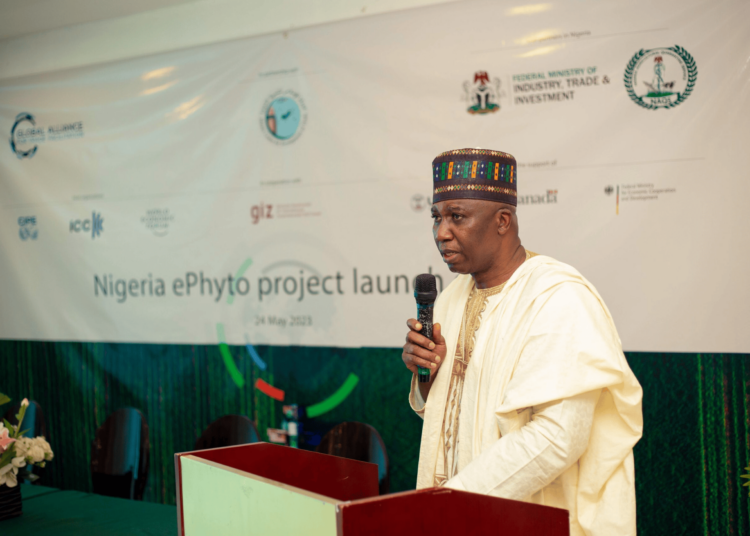With Nigeria now transiting from manual to electronic issuance of phytosanitary certificate to exporter of agric produce, this development, according to experts, is expected to increase government revenue from agricultural sector.
Phytosanitary certificate is an official document issued by governments to confirm that shipments of plants and plant products traded internationally are free of pests and diseases, and therefore, safe to import.
This transition is germane following series of complaint by other countries of farm produce exported from Nigeria as there are accusation of them being infected by pest, even as the long process of securing phyto certificate from the Nigeria Agricultural Quarantine Service(NAQS) by exporters, affects the quality of those produce by the time they get to the country of consumption.
To address this, NAQS launched IPPC GeNS E-Phyto platform where exporters can go to fill the needed information on the platform on the produce they are exporting and secure an inspection appointment with NAQS.
This, according to experts, would hasten the process and enhance quality of Nigerian agricultural produce meant for export.
Speaking on this development at official launch of the Generic ePhyto National System (GeNS) in Nigeria, in Ikeja, Lagos, at the weekend, Mr. Bernard Tayor of Alliance for Trade Facilitation(GIZ) said, the transition from traditional paper-based certificates to digital ones is a leap towards modernization, efficiency, and sustainability.
According to him, “Today’s equipment handover and demonstration symbolises more than just a technological upgrade; it represents a commitment to transparency, efficiency, and the facilitation of trade. It is a demonstration of our shared dedication to ensuring that Nigerian agricultural exports meet international standards and are globally competitive having saved cost and time in processing.”
The Global Alliance for Trade Facilitation, he stressed, is proud to partner with NAQS in this endeavour, saying, through collaboration, “we have strived to equip Nigeria with the tools and knowledge necessary to enhance its trade competitiveness, strengthen its economic resilience, and safeguard its agricultural sector.”
Digitalisation of phytosanitary certificates, he stressed, will streamline processes, reduce paperwork, minimise errors, and enhance the traceability of agricultural products, even as it is expected to improve the ease of doing business and bolster Nigeria’s reputation as a reliable trading partner on the global stage.
Together, we are building a more efficient, transparent, and resilient trade ecosystem, we are transforming the landscape of international trade facilitation, he noted.
On her part, the zonal coordinator of the South-West Zonal Command, NAQS, Dr. Joy Ivbade, applauded Islamic Centre for Development of Trade (ICDT), GIZ and the World Economic Forum for assisting NAQS to acquire the gadgets needed for the smooth running of the GeNS platform.
Speaking on behalf of Comptroller General, NAQS, (Dr. Vincent Isegbe, she said: ‘I would also like to recognise the role of Global Alliance, who coordinated several meetings between the NAQS and other stakeholders, guiding us through the business process analysis and training in using and managing the Generic ePhyto National System (GeNS).
Only recently, she said, these certificates were always physical paper documents that needed to travel great distances to be handled by numerous parties and risked being damaged, lost, or even faked, adding that, these challenges often cause a delay in the delivery of products and jeopardize legitimate trade, which sometimes results in spoiled goods, demurrage charges, and frustration.
Due to these challenges, the IPPC Secretariat, with support from the United Nations International Computing Centre (UNICC), she stated, has developed an ePhyto Solution to bring phytosanitary certification into the digital era.
The ePhyto Solution, she said, is inclusive and global, allowing countries without a National System to produce, receive, and exchange ePhytos through a central hub quickly, accurately, and at low cost.
However, the risk of loss, damage, or fraud to the certificate is significantly reduced, as it is the administrative burden on both border agencies and businesses, she stressed.
“We are confident the GeNs will improve the business environment in the country, border procedures, and strengthen plant and public health protection, she said.
Meanwhile, the IPPC Contact Point,Nigerian Plant Protection Organisation (NPPO), Mr. Idachaba Ebenezer, disclosed that, the initiators of this platform are working with Remita to tie up payment to the system, such that, the platform becomes a window to resolve all agric produce export transactions.
He believes this will revolutionise exporting of agric produce and makes the system faster, more coordinated, less stress and saves time.
NAQS received equipment donation from Global Alliance for Trade Facilitation, to support the initiative meant to revolutionise phytosanitary certification in the country.





